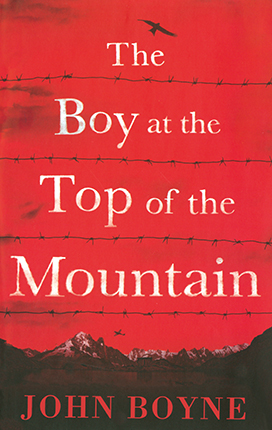Full Text Reviews: Booklist - 05/15/2016 On the eve of WWII, seven-year-old French orphan Pierrot is sent to live with his German aunt, a housekeeper at Hitler’s Austrian aerie, the Berghof, high atop the Obersalzberg. His name prudently changed to the German “Pieter” by his aunt, the boy warms to Hitler, who reminds him of his dead father, a man who often talked glowingly about the Vaterland and its destiny. Proud when Hitler makes him a member of the Deutsches Jungvolk, Pieter begins to identify himself as German, losing his innocence as he discovers the pleasures of power and feelings of importance. Soon he abandons a Jewish childhood friend and betrays those closest to him, becoming a sort of miniature Hitler. Though there is little subtlety to it, Boyne’s (The Boy in the Striped Pajamas, 2006) story is unarguably a powerful one with an often visceral impact. It does approach melodrama in treating many of its unsympathetic German characters, though there are others notably depicted with humanity. An epilogue brings the story to satisfying closure. - Copyright 2016 Booklist. Bulletin for the Center... - 06/01/2016 Too young to comprehend the political situation in 1930s Paris, young Pierrot is sorely troubled that his friends, the Bronsteins, cannot permanently care for him after his parents die. After a short stay in an orphanage, he is claimed by Aunt Beatrix, who warmly welcomes him to the grand estate in which she is the housekeeper. It’s a lovely place, on the mountain above the German town of Berchtesgaden, and while Beatrix’s employer isn’t often in residence, when he is home he lavishes young Pierrot (now taking the name Peter at the insistence of his aunt) with the kind of attention the little guy craves. Soon Peter is strutting in a kid-sized uniform, abandoning all correspondence with his old friend Anshel Bronstein, barking orders to the staff, reveling in the nationalistic and anti-Semitic propaganda that imbues the household, and ultimately sending his kind aunt and her lover-both members of the Resistance-to their deaths. Readers will figure out that Peter’s aunt works for Adolph Hitler, but the reveal isn’t the point; the book’s tone, symbolism, and foreshadowing cast Peter as the archetype of a war-battered and seethingly resentful people, both a bully writ large and a pitiful victim of demagoguery. With the simple structure and conversational vocabulary that reflect the point of view of an innocent-especially one on the cusp of disillusionment-this is similar in accessibility and challenge to Yelchin’s Breaking Stalin’s Nose (BCCB 11/11); expect this to be valued by independent readers as well as their history and literature teachers. EB - Copyright 2016 The Board of Trustees of the University of Illinois. Loading...
|



